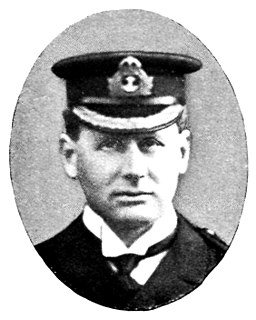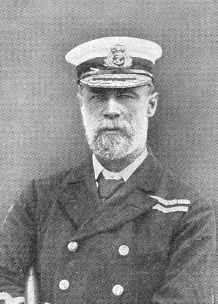Related Research Articles

The Admiralty was the British government department responsible for the command of the Royal Navy until 1964, historically under its titular head, the Lord High Admiral – one of the Great Officers of State. For much of its history, from the early 18th century until its abolition, the role of the Lord High Admiral was almost invariably put "in commission" and exercised by the Lords Commissioner of the Admiralty, who sat on the governing Board of Admiralty, rather than by a single person. The Admiralty was replaced by the Admiralty Board in 1964, as part of the reforms that created the Ministry of Defence and its Navy Department.

Admiral of the Fleet John Rushworth Jellicoe, 1st Earl Jellicoe, was a Royal Navy officer. He fought in the Anglo-Egyptian War and the Boxer Rebellion and commanded the Grand Fleet at the Battle of Jutland in May 1916 during the First World War. His handling of the fleet at that battle was controversial. Jellicoe made no serious mistakes and the German High Seas Fleet retreated to port, at a time when defeat would have been catastrophic for Britain, but the public was disappointed that the Royal Navy had not won a more dramatic victory given that they outnumbered the enemy. Jellicoe later served as First Sea Lord, overseeing the expansion of the Naval Staff at the Admiralty and the introduction of convoys, but was relieved at the end of 1917. He also served as the Governor-General of New Zealand in the early 1920s.

Admiral of the Fleet Louis Alexander Mountbatten, 1st Marquess of Milford Haven,, formerly Prince Louis Alexander of Battenberg, was a British naval officer and German prince related to the British royal family.

John Arbuthnot Fisher, 1st Baron Fisher,, commonly known as Jacky or Jackie Fisher, was a British Admiral of the Fleet. With more than sixty years in the Royal Navy, his efforts to reform the service helped to usher in an era of modernisation which saw the supersession of wooden sailing ships armed with muzzle-loading cannon by steel-hulled battlecruisers, submarines and the first aircraft carriers.

The post of Controller of the Navy was originally created in 1859 when the Surveyor of the Navy's title changed to Controller of the Navy. In 1869 the controller's office was abolished and its duties were assumed by that of the Third Naval Lord whose title then changed to Third Naval Lord and Controller of the Navy. In 1904 the title was changed again to Third Sea Lord and Controller of the Navy. In 1965 the office of the Third Sea Lord was abolished. The post-holder is responsible for procurement and matériel in the British Royal Navy.

The Queen Elizabeth-class battleships were a group of five super-dreadnoughts built for the Royal Navy during the 1910s. These battleships were superior in firepower, protection and speed to their Royal Navy predecessors of the Iron Duke class as well as preceding German classes such as the König class. The corresponding Bayern-class ships were generally considered competitive, although the Queen Elizabeth class were 2 knots (3.7 km/h) faster and outnumbered the German class 5:2. The Queen Elizabeths are generally considered the first fast battleships of their day.

Admiral Sir Hugh Evan-Thomas, was a British Royal Navy officer.

Admiral of the Fleet Sir Arthur Knyvet Wilson, 3rd Baronet, was a Royal Navy officer. He served in the Anglo-Egyptian War and then the Mahdist War being awarded the Victoria Cross during the Battle of El Teb in February 1884. He went on to command a battleship, the torpedo school HMS Vernon and then another battleship before taking charge of the Experimental Torpedo Squadron. He later commanded the Channel Fleet. He briefly served as First Sea Lord but in that role he "was abrasive, inarticulate, and autocratic" and was really only selected as Admiral Fisher's successor because he was a supporter of Fisher's reforms. Wilson survived for even less time than was intended by the stop-gap nature of his appointment because of his opposition to the establishment of a Naval Staff. Appointed an advisor at the start of World War I, he advocated offensive schemes in the North Sea including the capture of Heligoland and was an early proponent of the development and use of submarines in the Royal Navy.

Replenishment at sea (RAS) or underway replenishment (UNREP) is a method of transferring fuel, munitions, and stores from one ship to another while under way. First developed in the early 20th century it was used extensively by the United States Navy as a logistics support technique in the Pacific theatre of World War II, permitting U.S. carrier task forces to remain at sea indefinitely.

Admiral Sir Reginald Hugh Spencer Bacon, was an officer in the Royal Navy noted for his technical abilities. He was described by the First Sea Lord, Admiral Sir Jacky Fisher, as the man "acknowledged to be the cleverest officer in the Navy".

HMS Spiteful was a Spiteful-class torpedo boat destroyer built at Jarrow, England, by Palmers Shipbuilding and Iron Company for the Royal Navy and launched in 1899. Specified to be able to steam at 30 knots, she spent her entire career serving in the seas around the British Isles.
Sir Walter St David Jenkins CB CBE was a senior British official in the Admiralty, serving as Director of Navy Contracts from 1919 to 1936. Jenkins was born on 1 March 1874 and educated at Carmarthen Grammar School and Oswestry School. He won a Meyricke exhibition to Jesus College, Oxford in 1893, obtaining his Bachelor of Arts degree in 1897 before joining the Admiralty as a first-class clerk.

The First Lord of the Admiralty, or formally the Office of the First Lord of the Admiralty, was the political head of the English and later British Royal Navy. He was the government's senior adviser on all naval affairs, responsible for the direction and control of the Admiralty, and also of general administration of the Naval Service of the Kingdom of England, Great Britain in the 18th century, and then the United Kingdom, including the Royal Navy, the Royal Marines, and other services. It was one of the earliest known permanent government posts. Apart from being the political head of the Royal Navy the post holder simultaneously held the title of the President of the Board of Commissioners for Exercising the Office of Lord High Admiral. The office of First Lord of the Admiralty existed from 1628 until it was abolished when the Admiralty, Air Ministry, Ministry of Defence, and War Office were all merged to form the new Ministry of Defence in 1964. Its modern-day equivalent is the Secretary of State for Defence.

Admiral Sir Ernest Charles Thomas Troubridge, was an officer of the Royal Navy who served during the First World War.

Naval Officers of World War I is a large oil on canvas group portrait painting by Sir Arthur Stockdale Cope, completed in 1921. It was commissioned by South African financier Sir Abraham Bailey, 1st Baronet to commemorate the Royal Navy officers who commanded British fleets in the First World War. Cope's painting was first exhibited at the Royal Academy summer exhibition in 1921 and donated to the National Portrait Gallery that year.

The Admiralty War Staff was the former senior naval staff operational planning organisation within the British Admiralty that existed from 1912 to 1917. It was instituted on 8 January 1912 by Winston Churchill in his capacity as First Lord of the Admiralty and was in effect a war council whose head reported directly to the First Sea Lord. After the First World War ended, the War Staff was replaced by the Admiralty Naval Staff department.

The Admiral of Patrols was a former command appointment within the Admiralty during world war one usually held by a junior flag officer the post was established from 1912 to 1916.

The Mobilisation Division was the former Directorate of the British Admiralty Naval Staff responsible for mobilisation requirements, manning and war preparation planning from 1912-1918.

Sir Thomas Boverton Redwood FRSE FIC FCS FGS FRSA MIME (1846–1919) was a 19th-century British chemical engineer remembered as a pioneer of the petroleum industry. An early car-collector and enthusiast, he was also one of the first to investigate alcohol as a fuel.
Vice-Admiral Sir Robert Nelson Ommanney, KBE, CB was a British admiral who served in the Royal Navy. His service included commanding a cruiser on the China station during the Russo-Japanese War, Admiral Superintendent of the Chatham Dockyard and on special assignment in the Admiralty during World War I.
References
Footnotes
- ↑ Lambert was also made a member of the Privy Council in 1912, prior to his appointment to the Commission. [2] [3] Boverton Redwood advised the government on petroleum; Watts advised the Navy on naval construction; Oram was a vice admiral and the Admiralty's engineer-in-chief; Jellicoe was a vice admiral; Matthews was a former president of the Institution of Civil Engineers; Holland was a geologist and former director of the Geological Survey of India; Thorpe was a former president of the Chemical Society; Gracie was a naval architect; Jones was a petrochemical scientist; Yarrow was a leading shipbuilder and engineer. [4] Jones died on 15 August 1912, and George Thomas Beilby, another petrochemical scientist, was appointed as his replacement on 8 September 1912. [1] [5] [6] R. F. H. Henderson, an admiral, was appointed to the commission on 18 February 1913, as Jellicoe had been made Second Sea Lord. [7] [1]
Notes
- 1 2 3 4 5 6 7 "152. Fuel and Engines 1912–14". British History Online. 2017. Archived from the original on 2017-06-19. Retrieved 2018-12-17.
- 1 2 "No. 28632". The London Gazette. 2 August 1912. pp. 5721–5722.
- ↑ Gilbert 2015.
- ↑ Siegel 2002, p. 181; Watson 1988, p. 252; MacLeod 2004; Hammond 2008; Anon. 1930; Anon. 1932.
- ↑ Shorter 1979, p. 261.
- ↑ Anon. 1924.
- ↑ "Henderson, Reginald Friend Hannam". The National Archives. n.d. Archived from the original on 2018-12-18. Retrieved 2018-12-18.
- ↑ Black 2004, pp. 119, 134.
- 1 2 3 Siegel 2002, p. 180.
- ↑ Lyon 2005, p. 97.
- ↑ Black 2004, p. 119.
- ↑ Winegard 2016, p. 47.
- ↑ Black 2004, p. 133.
- ↑ Black 2004, pp. 133–4.
- 1 2 Dahl 2001, p. 52.
- 1 2 Brown 2003, p. 69.
- ↑ Brown 2003, p. 21.
- 1 2 Vassiliou 2018, p. 405.
- ↑ Kuiken 2014, p. 276.
- ↑ Toprani 2019, p. 31.